Module 3 Unit 3 Seeing the doctor 课件 (共88张PPT)
文档属性
| 名称 | Module 3 Unit 3 Seeing the doctor 课件 (共88张PPT) |

|
|
| 格式 | pptx | ||
| 文件大小 | 14.2MB | ||
| 资源类型 | 试卷 | ||
| 版本资源 | 牛津上海版(试用本) | ||
| 科目 | 英语 | ||
| 更新时间 | 2023-11-20 10:13:18 | ||
图片预览

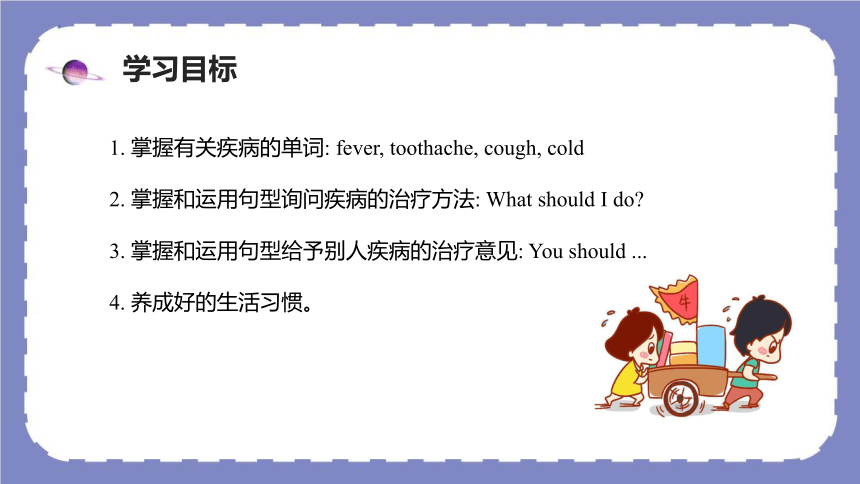
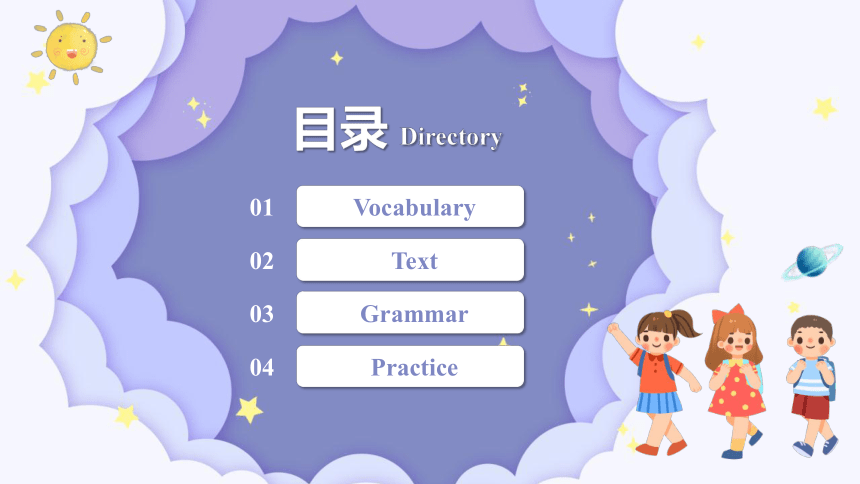
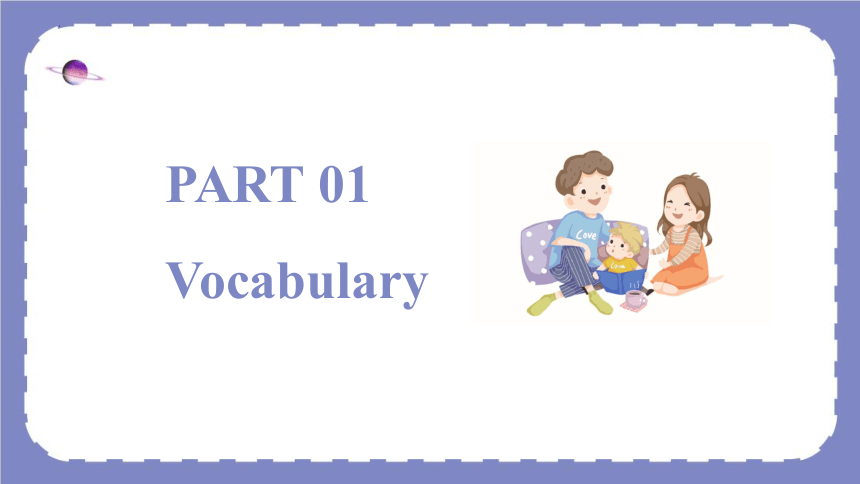
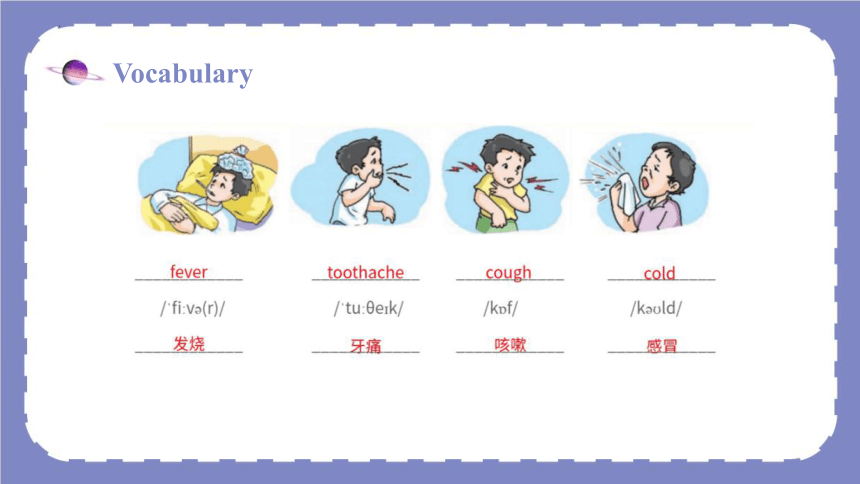
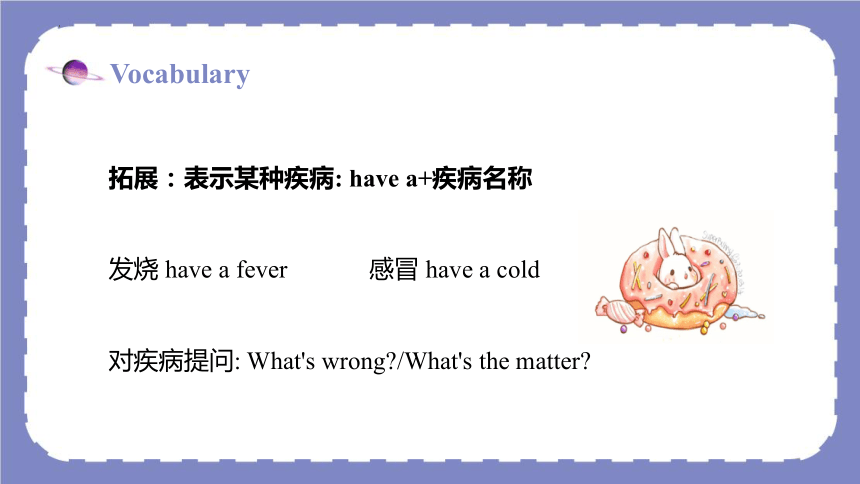
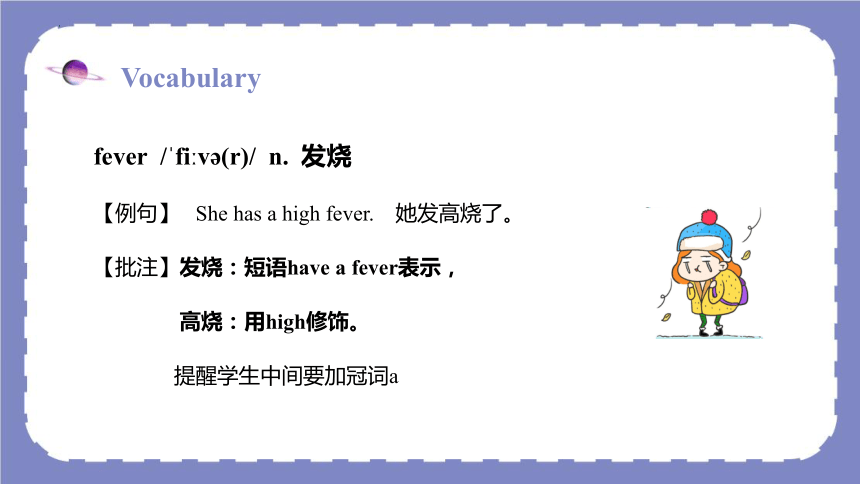
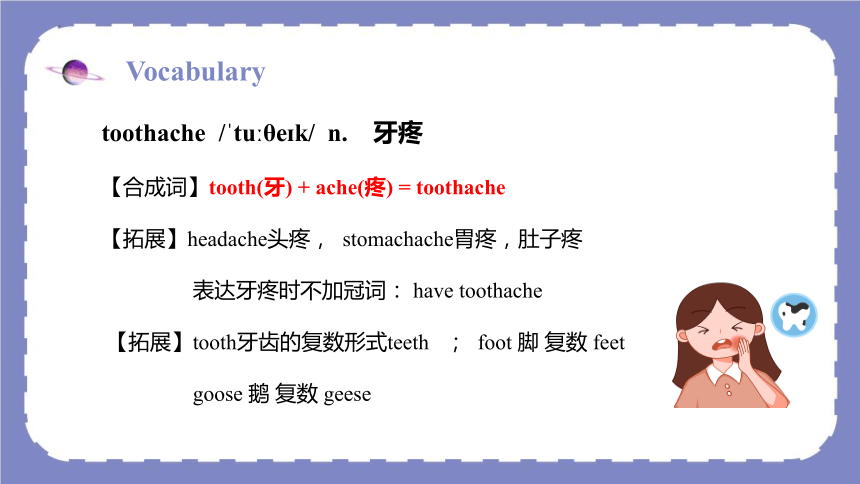
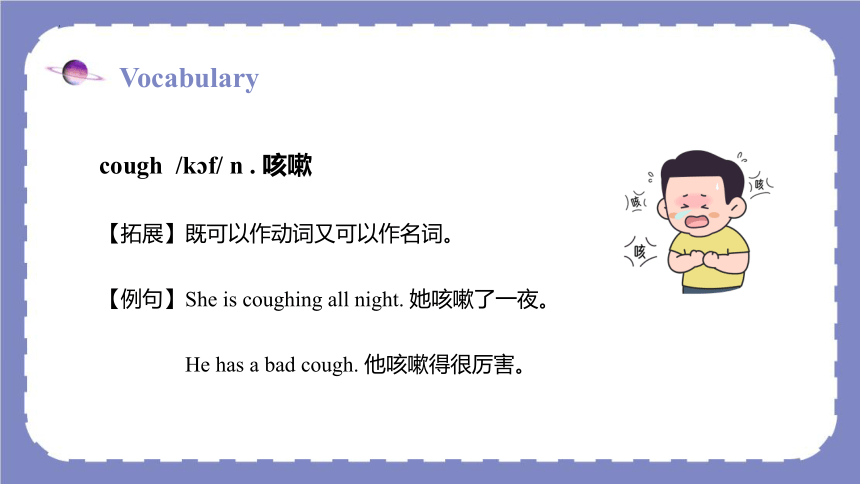
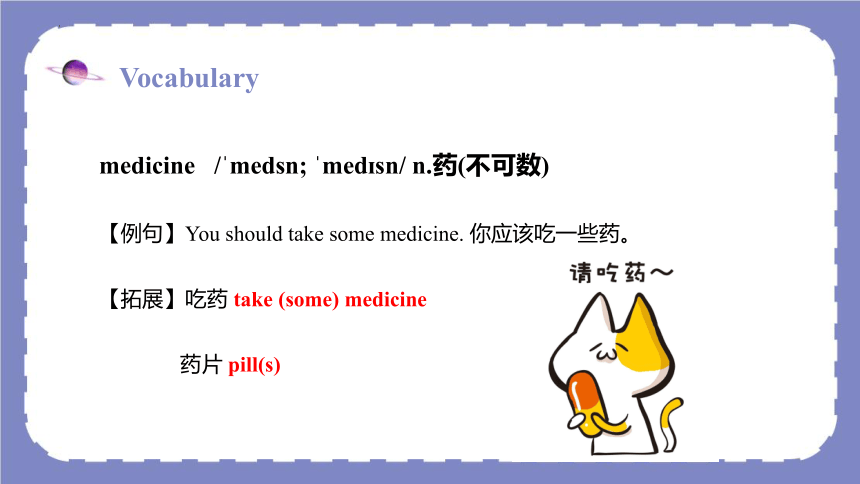


文档简介
(共88张PPT)
Module 3 Place and activities
Unit 3 Seeing the doctor
学习目标
1. 掌握有关疾病的单词: fever, toothache, cough, cold
2. 掌握和运用句型询问疾病的治疗方法: What should I do
3. 掌握和运用句型给予别人疾病的治疗意见: You should ...
4. 养成好的生活习惯。
01
Vocabulary
02
Text
03
Grammar
04
Practice
目录 Directory
行业PPT模板http:///hangye/
PART 01
Vocabulary
Vocabulary
Vocabulary
拓展:表示某种疾病: have a+疾病名称
发烧 have a fever 感冒 have a cold
对疾病提问: What's wrong /What's the matter
Vocabulary
fever / fi v (r)/ n. 发烧
【例句】 She has a high fever. 她发高烧了。
【批注】发烧:短语have a fever表示,
高烧:用high修饰。
提醒学生中间要加冠词a
Vocabulary
toothache / tu θe k/ n. 牙疼
【合成词】tooth(牙) + ache(疼) = toothache
【拓展】headache头疼, stomachache胃疼,肚子疼
表达牙疼时不加冠词: have toothache
【拓展】tooth牙齿的复数形式teeth ; foot 脚 复数 feet
goose 鹅 复数 geese
Vocabulary
cough /k f/ n . 咳嗽
【拓展】既可以作动词又可以作名词。
【例句】She is coughing all night. 她咳嗽了一夜。
He has a bad cough. 他咳嗽得很厉害。
Vocabulary
medicine / medsn; med sn/ n.药(不可数)
【例句】You should take some medicine. 你应该吃一些药。
【拓展】吃药 take (some) medicine
药片 pill(s)
too many和too much都表示:太多
too many 后加可数名词复数;
too much 后加不可数名词。
【例句】Don't eat too many sweets. 不要吃太多糖。
Don't drink too much juice.不要喝太多果汁。
cold /k uld/
(1)作名词,意为“感冒”。
【例句】It's snowing. He has a cold.天在下雪,他感冒了。
(2)作形容词,意为“冷的,凉的”。
【例句】It is very cold. You'd better not drink cold water.
天很冷,你最好不要喝凉水。
Vocabulary
Vocabulary
well /wel/
(1)作形容词,表示“身体好的,健康的”。
【例句】Are you feeling well 你感觉好了吗?
(2)作副词,意为“好地”。
【例句】He writes well. 他字写得很好。
(3)作名词,意为“水井”。
【例句】There is a well in our yard. 我们院子里有一口水井。
1.go to see the doctor/dentist 去看医生/牙医
2.wear warm clothes 穿暖和的衣服
3.drink a lot of water 多喝水
4.have a good rest 好好休息
5.take some medicine 吃药
Vocabulary
6.drink too many soft drinks 喝太多的软饮料
7.brush your teeth 刷牙
8.a large packet of sweets 一大包糖
9.put out 拔出
Vocabulary
PART 02
Text
Listen and say.
What should I do You should...
Kitty is not feeling well today. She goes to the hospital with her mum.
Listen and say.
Doctor: What's wrong with you How do you feel
Kitty: I have a cough.
Mum: She has a fever too.
Doctor: Open your mouth and let me have a look. Say 'Ah...'.
Kitty: Ah...
你怎么了?
咳嗽
发烧
看一看
Kitty is not feeling well today. She goes to the hospital with her mum.
Listen and say.
Doctor: You have a cold. You should take some medicine.
Kitty: I see. What else should I do
Doctor: You should drink a lot of water and have a good rest. You will be better soon.
Kitty: All right.
Mum: Thank you, Doctor.
Doctor: You're welcome.
感冒
吃药
a lot of + 可数名词复数/ 不可数名词
好好休息
Look and learn.
Ask and answer.
Ask and answer.
我应该怎么做......
Say and act.
A toothache.
Mum: Peter, come and have lunch!
Peter: I can't eat, Mum.
Mum: What's wrong with you
Peter: I have a toothache.
Mum: Oh dear! Let's go to see the dentist.
看牙医
Say and act.
Peter: I have a toothache.
Dentist: Let me look at your teeth. Do you often eat sweets
Peter:Yes.
Dentist: They're bad for your teeth. You shouldn't drink too many soft drinks either. How many times a day do you brush your teeth
Peter and his mum are at the dentist's.
在牙医诊所
牙疼
太多清饮料
刷牙
Say and act.
Peter: Once, in the morning.
Dentist:You should brush your teeth in the evening too.
Peter:I see. What should I do now
Dentist:You should take some medicine.
Peter:OK. Thank you.
Peter and his mum are at the dentist's.
一次, 早晨
吃药
Read a story.
The toothless tiger
The tiger is the king of the forest. All the other animals are afraid of him.
Tiger: I'm the king of the forest!
Animals: Help! Help! The tiger is coming.
害怕
Read a story.
The animals hide themselves in a secret cave. They have a meeting.
Animals: What should we do
Fox: I have an idea.
Read a story.
The fox gives the tiger a large packet of sweets.
Fox: My King, I have a present for you—the best food in the world.
Tiger: Really The tiger likes the sweets very much! He eats them every day.
一大包糖果
Read a story.
Very soon, the tiger has a toothache.
Tiger: Ouch! Ouch! My teeth hurt!
Fox: What's the matter, my King
Tiger: I have a toothache.
Fox: Don't worry. I can help you. Many animals come to help too. They pull out all the tiger's teeth. He becomes a toothless tiger!
Answer the questions
1 Who are the animals afraid of
2 What present does the fox give the tiger
3 Why does the tiger have a toothache
Listen and enjoy
Learn the sounds
判断划线部分读音是(T)否(F)相同。1. work word ( ) 2. bird third ( )3. panda again ( ) 4. teacher paper ( )5. nurse purple ( ) 6. farmer driver ( )7. along ago ( ) 8. salad banana ( )9. turn singer ( ) 10. girl large ( )
PART 03
Grammar
祈使句基本概念及用法
祈使句通常用来表示命令、请求、禁止、建议、警告等语气。它的主语you(听话人)通常省略;谓语动词一律用原形;句末用惊叹号或句号;用降调来读。
祈使无主语,you常被省去;动原当谓语,否定加don’t ;朗读用降调,惊叹和句号。
要不要型:
1)【类型】 Do/Don’t型
2)【结构】V(代表行为动词原形)+宾语+其它成分
Don’t+动词原形+其它成分
【例题精讲】 例1.Close the window. 关上窗户。 例2.Study hard! 努力学习!例3. Don’t be late. 不要迟到。 例4. Don’t read in the sun.别在阳光下看书。
简单Be 型:
1)【类型】 Be型
2)【结构】 Be+表语(名词/形容词等)+其它成分
【例题精讲】
例1.Be a good student!做个好学生!
例2.Be quiet! 安静!
让我们型
1)【类型】 Let型
2)【结构】 Let+宾语+动词原形+其它成分
【例题精讲】
例1.Let’s go home!咱们回家吧!
例2.Let her in. 让她进来。
不要不要型:
1)【类型】No型
2)【档案】 No+名词或动名词(是日常生活中常见的警示语)
【例题精讲】
例1. No photos!禁止拍照!
例2. No smoking! 严禁吸烟!
请求型:
1)【类型】客气委婉please型
2)【结构】 Please+动词短语(please也可放在句尾,其前加逗号)
【例题精讲】
例. Please sit down.=Sit down, please.
Let型的否定式有两种:
Don't + let + 宾语 + 动词原形 + 其它成分
Let + 宾语 + not + 动词原形 + 其它成分
如:Don't let him go. / Let him not go. 别让他走。
【巩固练习】
1. A sign with the words“____” is often found in a bus.
A. Not parking B. Not smoking C. No talking
2. Our teacher will always say“________”in class.
A. Not parking B. Not smoking C. No talking
3. 禁止通行!
_____________________!
一般现在时的概念:(1)表示事物或人物的特征、状态。如:____________________天空是蓝色的。
(2)表示经常性或习惯性的动作。(sometimes, often, usually, always常用于一般现在时态中) 如:____________________________________________.我每天六点起床。
(3)表示客观现实。如:_______________________________.地球绕着太阳转。
时间状语: every…, sometimes, on Sunday,once a week,twice a year
也常与often,sometimes,always,usually
一般现在时的句子结构:
主语+谓语动词do/ does,/be(am/is/are)/行为动词(或叫实义动词)+其他成分。
(1)be动词:主语+be(am, is, are)+其它。如:I am a boy.我是一个男孩。
(2)行为动词:主语+行为动词(+其它)。如:We study English.我们学习英语。 He usually has (his) breakfast at 7:00 in the morning. Mary likes Chinese.
【知识梳理3】一般现在时的句型转换:
有四种句式(肯定式、否定式、一般疑问式、特殊疑问式)
1)肯定句:主语+谓语动词do/ does,/be(am/is/are)/行为动词(或叫实义动词)+其他成分。
2)否定句:主语+ be + not +其它。 如:He is not a worker.他不是工人。
主语+ don't( doesn't ) +动词原形(+其它)。 如:I don't like bread.
3)一般疑问句:
Be +主语+其它? 如:-Are you a student -Yes. I am. / No, I'm not.
Do( Does ) +主语+实义动词原形+其它?
如:- Do you often play football - Yes, I do. / No, I don't.当主语为第三人称单数时,要用does构成一般疑问句。
如:- Does she go to work by bike - Yes, she does. / No, she doesn't.
I would like 变为一般疑问句时,应改为Would you like… 答语:Yes, please.(Yes, I’d like/love to.) No, thanks.(No, thank you.)
4)特殊疑问句:特殊疑问词+一般疑问句。如: Where is my bike How does your father go to work What time do you come home
动词三单变化规则:
1.一般情况下,直接加-s,
如:cook-cooks, milk-milks
2.以s. x. sh. ch. o结尾,加-es,
如:guess-guesses, wash-washes, watch-watches, go-goes,brush-brushes,
3.以“辅音字母+y”结尾,变y为i, 再加-es,
如:study-studies, fly-flies
写出下列动词的三单形式。Model: clean cleans1) watch __________ 2) wash __________ 3) cook_________4) paint _________ 5) use __________ 6) play _________7) carry _________ 8) study _________ 9) practice ________10) talk _________ 11) jump _________ 12) clean _________
第三人称单数的动词变化规则
(只有在第三人称为主语的肯定句中,动词才用三单式)
多数动词直接加s runs gets likes takes plays
结尾是s, x, sh, ch, o的动词加es watches teaches goes does washes crosses
辅音字母以y结尾的动词,变y为i加es carry→ carries cry→ cries
特殊变形 have→has
Be 动词在一般现在时中的变化
当主语是非第三人称单数时(I,You,We,You,They): 肯定句:主语+be动词+其他 I am a student./ We are nurses.
否定句:主语+be not +其他 I am not a student./ We are not nurses.
一般疑问句:Be 动词提前 + 其他不变 Are you students
特殊疑问句:特殊疑问词+be 提前 + 其他不变 How are you
当主语是第三人称单数时(He, She, It) 肯定句:主语+ is + 其他 He is nice.
否定句: 主语+ is not + 其他 He is not a student.
一般疑问句:Be 动词提前 + 其他不变 Is she a student
特殊疑问句:特殊疑问词+be 提前 + 其他不变 What is it
行为动词在一般现在时句型中的变化:
肯定句:主语+动词三单+其他 He plays football.
否定句:主语+ doesn't +动原+其他 He doesn’t play football.
一般疑问句:Does提前+ 主语+动原+其他 Does he play football
特殊疑问句:特殊疑问词+does提前+ 主语+动原+其他 What does he do
用所给词的适当形式填空。
1). Mob _______ (not like) cat food. He ________ (like) fish.
2). –Does Ginger ________ (climb) onto the door
-No, she _______.
改错(划出错误的地方,将正确的写在横线上)
1). Is your brother speak English _____ _____________
2). Does he likes going fishing __________ ________
3). He like playing games now. ______________ ____
4). Mr. Wu teachs us English. _________ _________
5). She don’t do her homework on Sundays. _________________
用have, there be 的适当形式填空
1. I ________ a computer, and my brother ________ a TV.
2. ________ ________ an apple and two books on the desk.
3. ________ ________ any milk in the glass
4. ________ ________ any sheep on the farm
5. She doesn’t _______ a sister.
6. He ________ a red bag, but his brother doesn’t ________ one.
PART 04
Sentences
1. What's wrong with you 你怎么了?
What's wrong with sb =What's the matter with sb
用来询问对方发生了什么事情?
【例句】 -What's wrong with you 你怎么了?-I have a headache. 我头疼。
【批注】 拓展表达询问对方发生了什么事的表达法:
What’s the matter with you What’s wrong
What’s the trouble What’s the problem with you
(1)I have a…
例 如 I have a cough. I have a cold. I have a toothache.
几个常见的-ache(疼痛)
表达:身体部位+ache,
stomachache 胃疼,headache 头疼,backache 背疼
(2)My(身体部位)hurt(s).
例如 My teeth hurt. My head hurts.
常见身体部位:eye 眼睛,ear 耳朵,nose 鼻子,mouth 嘴,
neck 脖子,shoulder 肩膀,arm 手臂,hand 手,
finger 手指,leg 腿,knee 膝盖,foot (复数 feet)脚,
toe 脚趾
2. Open your mouth and let me have a look. 张开嘴,让我看看。
(l)本句是祈使句。
(2)let sb do sth意为“让某人做某事”。let后面接不带to的动词不定式作宾语补足语。
【例句】 Let me tell you a story. 让我给你讲一个故事。
批注:拓展类似用法的动词:make sb. do sth. help sb. do sth.
祈使句的否定句改写:在句首加Don’t
3. You will be better soon.你很快就会好起来的。
(1) better在这里是well的比较级,意思是,相对于现在更好。比较级是两者比较,更……,比较……。只有形容词和副词才有比较级。
【例句】 His handwriting is better than mine. 他的书法比我的好。
(2) will be是一般将来时结构,即will加上动词原形,表示将来要发生的动作。
【例句】 He will come to see you tomorrow. 他明天将来看你。
She will be a doctor. 她将成为一名医生。
批注:拓展一些不规则形容词副词比较级
原形 比较级 最高级
good well better best
bad worse worst
much many more most
little less least
4. They’re bad for your teeth. 它们对你的牙齿有害。
be bad for 意为“对……有害”,其反义词组为 be good for “对……有益”。
【例句】 Smoking is bad for your health. 吸烟对你的健康有害。
The fresh air in the mountain is good for our health.
山中清新的空气对我们的健康有益。
批注:拓展 对……有害的 同义词组 be harmful to
注意 be bad at / be good at 表示对……不擅长、对……擅长
5.The animals hide themselves in a secret cave.
动物们吧自己藏在一个隐密的洞里。
hide oneself 把自己藏起来。oneself 是反身代词,意为某人自己”。
【例句】 The boy teaches himself English.
这个男孩自学英语。
Help yourself to some fish. 请随便吃点鱼吧。
批注:总结反身代词 myself, himself, herself, itself,
yourself, yourselves, themselves, ourselves
常考反身代词词组:teach oneself 自学
help oneself to 随便吃,别客气
make oneself at home 就像在自己家一样
by oneself 靠某人自己
for oneself 为某人自己
What should I do 我应该做什么?
You should wear warm clothes. 你应该穿暖和的衣服。
should 的意思是“应该”,是一个情态动词,情态动词三原则如下:
(1)无三单:He should run.
(2)后加原形:She should sing.
(3)否定直接+not:Gina should not (shouldn't) swim.
给出建议: You should drink more water/ eat fresh vegetables/ take some medicine.
How do you feel 你感觉怎么样?
You will be better soon. 你很快就会好些的。
feel 此处是一个系动词,表示状况或态度,后加形容词。
常见的系动词还有 be, feel, smell, sound, taste, feel 等。
例如 He is tall. The music sounds good.
*better 是 good 的比较级:good-better-the best,最高级前要加 the。
bad 的比较级和最高级也是特殊形式:bad-worse-the worst
PART 05
Practice
用括号内所给动词的适当形式填空。 1. It’s an important meeting. ____________ (not, be ) late. 2. ____________ (not, make) any noise! Your mother is sleeping. 3. ____________ (not, speak) with your mouth full of food and ____________ (be) polite. 4. ____________ ( not, talk) and ____________ (read) aloud. 5. ____________ (not, leave) your homework for tomorrow, Larry.
用括号内所给动词的适当形式填空。
6. ____________ (look) out! A car is coming.
7. ____________ (give) us ten years and just see what our country will be like.
8. ____________ (not, let) the baby cry.
9. Wear more clothes or you ____________ (catch) a cold.
10. Let’s ____________ (not, say) anything about it.
Fill in the blanks with the prepositions. 用所给介词填空。
with into for to at on
1.Look at the sign. You can't jump _______ the pool.
2.There are many rules_______ the library.
3.Don't play _______the rubber when you are having a lesson.
4.The Pings are _______the swimming pool.
5.Don't walk_______ the grass. It's a bad behavior.
6.Let's go _______ the bus stop now.
Read and choose. 选出与画线部分意义相同的选项。
( ) 1. No bicycles on the grass.
A. Don't ride a bicycle B. You can ride your bicycle C. Please ride a bicycle
( ) 2. Play ball games with me.
A. video games B. with the ball C. with me the games
( ) 3. Don't play football after 4 p. m.
A. Play football at B. Don't play football at C. Please play football before
选择题
1. Her doctor said, “ work so hard.”
A. Stop B. Don’t C. Can’t D. No
2. him the secret, will you
A. Don’t tell B. Not to tell C. Not telling D. No telling
3. to be here at 8 o’clock, Sandy.
A. Is sure B. Is sure that C. Will be sure D. Be sure
( ) 4. Tom is a worker. He _____ in a factory. His sisters _____ in a hospital.
A. work/ work B. works/ work C. work/ works
( ) 5. Who _____ English best in your class
A. speak B. speaks C. speaking
( ) 6. Mrs Read _____ the windows every day.
A. is cleaning B. clean C. cleans
( ) 7. We _____ music and often _____ to music.
A. like/ listen B. likes/ listens C. like/ are listening
( ) 8. She _____ up at six in the morning.
A. get B. gets C. getting
( ) 9. On Sundays he sometimes ____ his clothes and sometimes _____ some shopping.
A. wash/ do B. is washing/ is doing C. washes/ does
填空:
1. My father always ______________ (come) back from work very late.
2. Kitty __________ a new uniform (have), she __________ it very much.(like)
3. My sisters __________ two cups of milk..(want)
4. ______________ your brother ______________ (know) Japanese
5. Where ______________ you ______________ (have) lunch every day
6. The girl ______________ (like) wearing a skirt.
用适当的词填空:
1. We often___________(play) in the playground.
2. He _________ (get) up at six o’clock.
3. __________your brothers _________ (brush) your teeth every morning.
4. What (do) he usually (do) after school
5. Danny (study) English, Chinese, Math, Science and Art at school.
6. Mike sometimes __________(go) to the park with his sister.
7. At eight at night, she __________(watch) TV with his parents.
8. ________ Mike________(read) English every day
9. How many lessons _________your classmates________(have) on Monday
10. What time _________his mother_________(do) the housework
按要求改写句子。
1.You have an English class on Friday afternoon. (改为否定句)
You ________ _________ an English class on Friday afternoon.
2.They go to the zoo on Children’s Day. (划线部分提问)
_________ _______ they ________ on Children’s Day
3.Mother Duck feeds her babies every day. (改为一般疑问句)
_________ Mother Duck _________ her babies every day
按要求改写句子。1. There is an ugly duckling in the pond. (改为否定句,句意不变)There _______ ________ _________ duckling in the pond.2. It’s cold in winter. (划线部分提问)_________ is the ________ _________ in winter 3. We have a class party on Children’s Day. (对划线部分提问)_________ _________ you _________ on Children’s Day.4. I like the Spring Festival. I like the Mid-autumn Festival.(改为选择疑问句)_______ _______like the Spring Festival _________ the Mid-autumn Festival
根据短文判断正误,对的写“T”,错的写“F”。 Jane and Mary are good friends. Their families are in Shanghai now. Jane is from Britain and Mary is from America. They are in the same school. But they aren’t classmates. Jane is in Class One. Miss May is her teacher. Mary is in Miss White’s class. They study Chinese. They like it. They like Shanghai, too.( ) 1. Jane and Mary are good friends and classmates.( ) 2. Their families aren’t in Shanghai now.( ) 3. Miss May is the teacher of Class One.( ) 4. Mary is in Class One.( ) 5. Jane and Mary study Chinese and they like it.
阅读填空。
Mr Wang is a retired worker(退休工人). _______ has got a fruit shop in Dongling Street. There are many apples, oranges, pears ________ bananas in it. The shop is open __________ seven in the morning to seven in the evening. Every day, a lot of people come to the shop. They get there to buy _______. Mr Wang is glad to help them. He often says, “Eating fruit is good for people’s health.” He likes to _________ in the fruit shop.
( ) 1. A. She B. He C. It
( ) 2. A. and B. but C. or
( ) 3. A. at B. from C. on
( ) 4. A. apples B. food C. fruit
( ) 5. A. study B. eat C. work
Thank you!
Module 3 Place and activities
Unit 3 Seeing the doctor
学习目标
1. 掌握有关疾病的单词: fever, toothache, cough, cold
2. 掌握和运用句型询问疾病的治疗方法: What should I do
3. 掌握和运用句型给予别人疾病的治疗意见: You should ...
4. 养成好的生活习惯。
01
Vocabulary
02
Text
03
Grammar
04
Practice
目录 Directory
行业PPT模板http:///hangye/
PART 01
Vocabulary
Vocabulary
Vocabulary
拓展:表示某种疾病: have a+疾病名称
发烧 have a fever 感冒 have a cold
对疾病提问: What's wrong /What's the matter
Vocabulary
fever / fi v (r)/ n. 发烧
【例句】 She has a high fever. 她发高烧了。
【批注】发烧:短语have a fever表示,
高烧:用high修饰。
提醒学生中间要加冠词a
Vocabulary
toothache / tu θe k/ n. 牙疼
【合成词】tooth(牙) + ache(疼) = toothache
【拓展】headache头疼, stomachache胃疼,肚子疼
表达牙疼时不加冠词: have toothache
【拓展】tooth牙齿的复数形式teeth ; foot 脚 复数 feet
goose 鹅 复数 geese
Vocabulary
cough /k f/ n . 咳嗽
【拓展】既可以作动词又可以作名词。
【例句】She is coughing all night. 她咳嗽了一夜。
He has a bad cough. 他咳嗽得很厉害。
Vocabulary
medicine / medsn; med sn/ n.药(不可数)
【例句】You should take some medicine. 你应该吃一些药。
【拓展】吃药 take (some) medicine
药片 pill(s)
too many和too much都表示:太多
too many 后加可数名词复数;
too much 后加不可数名词。
【例句】Don't eat too many sweets. 不要吃太多糖。
Don't drink too much juice.不要喝太多果汁。
cold /k uld/
(1)作名词,意为“感冒”。
【例句】It's snowing. He has a cold.天在下雪,他感冒了。
(2)作形容词,意为“冷的,凉的”。
【例句】It is very cold. You'd better not drink cold water.
天很冷,你最好不要喝凉水。
Vocabulary
Vocabulary
well /wel/
(1)作形容词,表示“身体好的,健康的”。
【例句】Are you feeling well 你感觉好了吗?
(2)作副词,意为“好地”。
【例句】He writes well. 他字写得很好。
(3)作名词,意为“水井”。
【例句】There is a well in our yard. 我们院子里有一口水井。
1.go to see the doctor/dentist 去看医生/牙医
2.wear warm clothes 穿暖和的衣服
3.drink a lot of water 多喝水
4.have a good rest 好好休息
5.take some medicine 吃药
Vocabulary
6.drink too many soft drinks 喝太多的软饮料
7.brush your teeth 刷牙
8.a large packet of sweets 一大包糖
9.put out 拔出
Vocabulary
PART 02
Text
Listen and say.
What should I do You should...
Kitty is not feeling well today. She goes to the hospital with her mum.
Listen and say.
Doctor: What's wrong with you How do you feel
Kitty: I have a cough.
Mum: She has a fever too.
Doctor: Open your mouth and let me have a look. Say 'Ah...'.
Kitty: Ah...
你怎么了?
咳嗽
发烧
看一看
Kitty is not feeling well today. She goes to the hospital with her mum.
Listen and say.
Doctor: You have a cold. You should take some medicine.
Kitty: I see. What else should I do
Doctor: You should drink a lot of water and have a good rest. You will be better soon.
Kitty: All right.
Mum: Thank you, Doctor.
Doctor: You're welcome.
感冒
吃药
a lot of + 可数名词复数/ 不可数名词
好好休息
Look and learn.
Ask and answer.
Ask and answer.
我应该怎么做......
Say and act.
A toothache.
Mum: Peter, come and have lunch!
Peter: I can't eat, Mum.
Mum: What's wrong with you
Peter: I have a toothache.
Mum: Oh dear! Let's go to see the dentist.
看牙医
Say and act.
Peter: I have a toothache.
Dentist: Let me look at your teeth. Do you often eat sweets
Peter:Yes.
Dentist: They're bad for your teeth. You shouldn't drink too many soft drinks either. How many times a day do you brush your teeth
Peter and his mum are at the dentist's.
在牙医诊所
牙疼
太多清饮料
刷牙
Say and act.
Peter: Once, in the morning.
Dentist:You should brush your teeth in the evening too.
Peter:I see. What should I do now
Dentist:You should take some medicine.
Peter:OK. Thank you.
Peter and his mum are at the dentist's.
一次, 早晨
吃药
Read a story.
The toothless tiger
The tiger is the king of the forest. All the other animals are afraid of him.
Tiger: I'm the king of the forest!
Animals: Help! Help! The tiger is coming.
害怕
Read a story.
The animals hide themselves in a secret cave. They have a meeting.
Animals: What should we do
Fox: I have an idea.
Read a story.
The fox gives the tiger a large packet of sweets.
Fox: My King, I have a present for you—the best food in the world.
Tiger: Really The tiger likes the sweets very much! He eats them every day.
一大包糖果
Read a story.
Very soon, the tiger has a toothache.
Tiger: Ouch! Ouch! My teeth hurt!
Fox: What's the matter, my King
Tiger: I have a toothache.
Fox: Don't worry. I can help you. Many animals come to help too. They pull out all the tiger's teeth. He becomes a toothless tiger!
Answer the questions
1 Who are the animals afraid of
2 What present does the fox give the tiger
3 Why does the tiger have a toothache
Listen and enjoy
Learn the sounds
判断划线部分读音是(T)否(F)相同。1. work word ( ) 2. bird third ( )3. panda again ( ) 4. teacher paper ( )5. nurse purple ( ) 6. farmer driver ( )7. along ago ( ) 8. salad banana ( )9. turn singer ( ) 10. girl large ( )
PART 03
Grammar
祈使句基本概念及用法
祈使句通常用来表示命令、请求、禁止、建议、警告等语气。它的主语you(听话人)通常省略;谓语动词一律用原形;句末用惊叹号或句号;用降调来读。
祈使无主语,you常被省去;动原当谓语,否定加don’t ;朗读用降调,惊叹和句号。
要不要型:
1)【类型】 Do/Don’t型
2)【结构】V(代表行为动词原形)+宾语+其它成分
Don’t+动词原形+其它成分
【例题精讲】 例1.Close the window. 关上窗户。 例2.Study hard! 努力学习!例3. Don’t be late. 不要迟到。 例4. Don’t read in the sun.别在阳光下看书。
简单Be 型:
1)【类型】 Be型
2)【结构】 Be+表语(名词/形容词等)+其它成分
【例题精讲】
例1.Be a good student!做个好学生!
例2.Be quiet! 安静!
让我们型
1)【类型】 Let型
2)【结构】 Let+宾语+动词原形+其它成分
【例题精讲】
例1.Let’s go home!咱们回家吧!
例2.Let her in. 让她进来。
不要不要型:
1)【类型】No型
2)【档案】 No+名词或动名词(是日常生活中常见的警示语)
【例题精讲】
例1. No photos!禁止拍照!
例2. No smoking! 严禁吸烟!
请求型:
1)【类型】客气委婉please型
2)【结构】 Please+动词短语(please也可放在句尾,其前加逗号)
【例题精讲】
例. Please sit down.=Sit down, please.
Let型的否定式有两种:
Don't + let + 宾语 + 动词原形 + 其它成分
Let + 宾语 + not + 动词原形 + 其它成分
如:Don't let him go. / Let him not go. 别让他走。
【巩固练习】
1. A sign with the words“____” is often found in a bus.
A. Not parking B. Not smoking C. No talking
2. Our teacher will always say“________”in class.
A. Not parking B. Not smoking C. No talking
3. 禁止通行!
_____________________!
一般现在时的概念:(1)表示事物或人物的特征、状态。如:____________________天空是蓝色的。
(2)表示经常性或习惯性的动作。(sometimes, often, usually, always常用于一般现在时态中) 如:____________________________________________.我每天六点起床。
(3)表示客观现实。如:_______________________________.地球绕着太阳转。
时间状语: every…, sometimes, on Sunday,once a week,twice a year
也常与often,sometimes,always,usually
一般现在时的句子结构:
主语+谓语动词do/ does,/be(am/is/are)/行为动词(或叫实义动词)+其他成分。
(1)be动词:主语+be(am, is, are)+其它。如:I am a boy.我是一个男孩。
(2)行为动词:主语+行为动词(+其它)。如:We study English.我们学习英语。 He usually has (his) breakfast at 7:00 in the morning. Mary likes Chinese.
【知识梳理3】一般现在时的句型转换:
有四种句式(肯定式、否定式、一般疑问式、特殊疑问式)
1)肯定句:主语+谓语动词do/ does,/be(am/is/are)/行为动词(或叫实义动词)+其他成分。
2)否定句:主语+ be + not +其它。 如:He is not a worker.他不是工人。
主语+ don't( doesn't ) +动词原形(+其它)。 如:I don't like bread.
3)一般疑问句:
Be +主语+其它? 如:-Are you a student -Yes. I am. / No, I'm not.
Do( Does ) +主语+实义动词原形+其它?
如:- Do you often play football - Yes, I do. / No, I don't.当主语为第三人称单数时,要用does构成一般疑问句。
如:- Does she go to work by bike - Yes, she does. / No, she doesn't.
I would like 变为一般疑问句时,应改为Would you like… 答语:Yes, please.(Yes, I’d like/love to.) No, thanks.(No, thank you.)
4)特殊疑问句:特殊疑问词+一般疑问句。如: Where is my bike How does your father go to work What time do you come home
动词三单变化规则:
1.一般情况下,直接加-s,
如:cook-cooks, milk-milks
2.以s. x. sh. ch. o结尾,加-es,
如:guess-guesses, wash-washes, watch-watches, go-goes,brush-brushes,
3.以“辅音字母+y”结尾,变y为i, 再加-es,
如:study-studies, fly-flies
写出下列动词的三单形式。Model: clean cleans1) watch __________ 2) wash __________ 3) cook_________4) paint _________ 5) use __________ 6) play _________7) carry _________ 8) study _________ 9) practice ________10) talk _________ 11) jump _________ 12) clean _________
第三人称单数的动词变化规则
(只有在第三人称为主语的肯定句中,动词才用三单式)
多数动词直接加s runs gets likes takes plays
结尾是s, x, sh, ch, o的动词加es watches teaches goes does washes crosses
辅音字母以y结尾的动词,变y为i加es carry→ carries cry→ cries
特殊变形 have→has
Be 动词在一般现在时中的变化
当主语是非第三人称单数时(I,You,We,You,They): 肯定句:主语+be动词+其他 I am a student./ We are nurses.
否定句:主语+be not +其他 I am not a student./ We are not nurses.
一般疑问句:Be 动词提前 + 其他不变 Are you students
特殊疑问句:特殊疑问词+be 提前 + 其他不变 How are you
当主语是第三人称单数时(He, She, It) 肯定句:主语+ is + 其他 He is nice.
否定句: 主语+ is not + 其他 He is not a student.
一般疑问句:Be 动词提前 + 其他不变 Is she a student
特殊疑问句:特殊疑问词+be 提前 + 其他不变 What is it
行为动词在一般现在时句型中的变化:
肯定句:主语+动词三单+其他 He plays football.
否定句:主语+ doesn't +动原+其他 He doesn’t play football.
一般疑问句:Does提前+ 主语+动原+其他 Does he play football
特殊疑问句:特殊疑问词+does提前+ 主语+动原+其他 What does he do
用所给词的适当形式填空。
1). Mob _______ (not like) cat food. He ________ (like) fish.
2). –Does Ginger ________ (climb) onto the door
-No, she _______.
改错(划出错误的地方,将正确的写在横线上)
1). Is your brother speak English _____ _____________
2). Does he likes going fishing __________ ________
3). He like playing games now. ______________ ____
4). Mr. Wu teachs us English. _________ _________
5). She don’t do her homework on Sundays. _________________
用have, there be 的适当形式填空
1. I ________ a computer, and my brother ________ a TV.
2. ________ ________ an apple and two books on the desk.
3. ________ ________ any milk in the glass
4. ________ ________ any sheep on the farm
5. She doesn’t _______ a sister.
6. He ________ a red bag, but his brother doesn’t ________ one.
PART 04
Sentences
1. What's wrong with you 你怎么了?
What's wrong with sb =What's the matter with sb
用来询问对方发生了什么事情?
【例句】 -What's wrong with you 你怎么了?-I have a headache. 我头疼。
【批注】 拓展表达询问对方发生了什么事的表达法:
What’s the matter with you What’s wrong
What’s the trouble What’s the problem with you
(1)I have a…
例 如 I have a cough. I have a cold. I have a toothache.
几个常见的-ache(疼痛)
表达:身体部位+ache,
stomachache 胃疼,headache 头疼,backache 背疼
(2)My(身体部位)hurt(s).
例如 My teeth hurt. My head hurts.
常见身体部位:eye 眼睛,ear 耳朵,nose 鼻子,mouth 嘴,
neck 脖子,shoulder 肩膀,arm 手臂,hand 手,
finger 手指,leg 腿,knee 膝盖,foot (复数 feet)脚,
toe 脚趾
2. Open your mouth and let me have a look. 张开嘴,让我看看。
(l)本句是祈使句。
(2)let sb do sth意为“让某人做某事”。let后面接不带to的动词不定式作宾语补足语。
【例句】 Let me tell you a story. 让我给你讲一个故事。
批注:拓展类似用法的动词:make sb. do sth. help sb. do sth.
祈使句的否定句改写:在句首加Don’t
3. You will be better soon.你很快就会好起来的。
(1) better在这里是well的比较级,意思是,相对于现在更好。比较级是两者比较,更……,比较……。只有形容词和副词才有比较级。
【例句】 His handwriting is better than mine. 他的书法比我的好。
(2) will be是一般将来时结构,即will加上动词原形,表示将来要发生的动作。
【例句】 He will come to see you tomorrow. 他明天将来看你。
She will be a doctor. 她将成为一名医生。
批注:拓展一些不规则形容词副词比较级
原形 比较级 最高级
good well better best
bad worse worst
much many more most
little less least
4. They’re bad for your teeth. 它们对你的牙齿有害。
be bad for 意为“对……有害”,其反义词组为 be good for “对……有益”。
【例句】 Smoking is bad for your health. 吸烟对你的健康有害。
The fresh air in the mountain is good for our health.
山中清新的空气对我们的健康有益。
批注:拓展 对……有害的 同义词组 be harmful to
注意 be bad at / be good at 表示对……不擅长、对……擅长
5.The animals hide themselves in a secret cave.
动物们吧自己藏在一个隐密的洞里。
hide oneself 把自己藏起来。oneself 是反身代词,意为某人自己”。
【例句】 The boy teaches himself English.
这个男孩自学英语。
Help yourself to some fish. 请随便吃点鱼吧。
批注:总结反身代词 myself, himself, herself, itself,
yourself, yourselves, themselves, ourselves
常考反身代词词组:teach oneself 自学
help oneself to 随便吃,别客气
make oneself at home 就像在自己家一样
by oneself 靠某人自己
for oneself 为某人自己
What should I do 我应该做什么?
You should wear warm clothes. 你应该穿暖和的衣服。
should 的意思是“应该”,是一个情态动词,情态动词三原则如下:
(1)无三单:He should run.
(2)后加原形:She should sing.
(3)否定直接+not:Gina should not (shouldn't) swim.
给出建议: You should drink more water/ eat fresh vegetables/ take some medicine.
How do you feel 你感觉怎么样?
You will be better soon. 你很快就会好些的。
feel 此处是一个系动词,表示状况或态度,后加形容词。
常见的系动词还有 be, feel, smell, sound, taste, feel 等。
例如 He is tall. The music sounds good.
*better 是 good 的比较级:good-better-the best,最高级前要加 the。
bad 的比较级和最高级也是特殊形式:bad-worse-the worst
PART 05
Practice
用括号内所给动词的适当形式填空。 1. It’s an important meeting. ____________ (not, be ) late. 2. ____________ (not, make) any noise! Your mother is sleeping. 3. ____________ (not, speak) with your mouth full of food and ____________ (be) polite. 4. ____________ ( not, talk) and ____________ (read) aloud. 5. ____________ (not, leave) your homework for tomorrow, Larry.
用括号内所给动词的适当形式填空。
6. ____________ (look) out! A car is coming.
7. ____________ (give) us ten years and just see what our country will be like.
8. ____________ (not, let) the baby cry.
9. Wear more clothes or you ____________ (catch) a cold.
10. Let’s ____________ (not, say) anything about it.
Fill in the blanks with the prepositions. 用所给介词填空。
with into for to at on
1.Look at the sign. You can't jump _______ the pool.
2.There are many rules_______ the library.
3.Don't play _______the rubber when you are having a lesson.
4.The Pings are _______the swimming pool.
5.Don't walk_______ the grass. It's a bad behavior.
6.Let's go _______ the bus stop now.
Read and choose. 选出与画线部分意义相同的选项。
( ) 1. No bicycles on the grass.
A. Don't ride a bicycle B. You can ride your bicycle C. Please ride a bicycle
( ) 2. Play ball games with me.
A. video games B. with the ball C. with me the games
( ) 3. Don't play football after 4 p. m.
A. Play football at B. Don't play football at C. Please play football before
选择题
1. Her doctor said, “ work so hard.”
A. Stop B. Don’t C. Can’t D. No
2. him the secret, will you
A. Don’t tell B. Not to tell C. Not telling D. No telling
3. to be here at 8 o’clock, Sandy.
A. Is sure B. Is sure that C. Will be sure D. Be sure
( ) 4. Tom is a worker. He _____ in a factory. His sisters _____ in a hospital.
A. work/ work B. works/ work C. work/ works
( ) 5. Who _____ English best in your class
A. speak B. speaks C. speaking
( ) 6. Mrs Read _____ the windows every day.
A. is cleaning B. clean C. cleans
( ) 7. We _____ music and often _____ to music.
A. like/ listen B. likes/ listens C. like/ are listening
( ) 8. She _____ up at six in the morning.
A. get B. gets C. getting
( ) 9. On Sundays he sometimes ____ his clothes and sometimes _____ some shopping.
A. wash/ do B. is washing/ is doing C. washes/ does
填空:
1. My father always ______________ (come) back from work very late.
2. Kitty __________ a new uniform (have), she __________ it very much.(like)
3. My sisters __________ two cups of milk..(want)
4. ______________ your brother ______________ (know) Japanese
5. Where ______________ you ______________ (have) lunch every day
6. The girl ______________ (like) wearing a skirt.
用适当的词填空:
1. We often___________(play) in the playground.
2. He _________ (get) up at six o’clock.
3. __________your brothers _________ (brush) your teeth every morning.
4. What (do) he usually (do) after school
5. Danny (study) English, Chinese, Math, Science and Art at school.
6. Mike sometimes __________(go) to the park with his sister.
7. At eight at night, she __________(watch) TV with his parents.
8. ________ Mike________(read) English every day
9. How many lessons _________your classmates________(have) on Monday
10. What time _________his mother_________(do) the housework
按要求改写句子。
1.You have an English class on Friday afternoon. (改为否定句)
You ________ _________ an English class on Friday afternoon.
2.They go to the zoo on Children’s Day. (划线部分提问)
_________ _______ they ________ on Children’s Day
3.Mother Duck feeds her babies every day. (改为一般疑问句)
_________ Mother Duck _________ her babies every day
按要求改写句子。1. There is an ugly duckling in the pond. (改为否定句,句意不变)There _______ ________ _________ duckling in the pond.2. It’s cold in winter. (划线部分提问)_________ is the ________ _________ in winter 3. We have a class party on Children’s Day. (对划线部分提问)_________ _________ you _________ on Children’s Day.4. I like the Spring Festival. I like the Mid-autumn Festival.(改为选择疑问句)_______ _______like the Spring Festival _________ the Mid-autumn Festival
根据短文判断正误,对的写“T”,错的写“F”。 Jane and Mary are good friends. Their families are in Shanghai now. Jane is from Britain and Mary is from America. They are in the same school. But they aren’t classmates. Jane is in Class One. Miss May is her teacher. Mary is in Miss White’s class. They study Chinese. They like it. They like Shanghai, too.( ) 1. Jane and Mary are good friends and classmates.( ) 2. Their families aren’t in Shanghai now.( ) 3. Miss May is the teacher of Class One.( ) 4. Mary is in Class One.( ) 5. Jane and Mary study Chinese and they like it.
阅读填空。
Mr Wang is a retired worker(退休工人). _______ has got a fruit shop in Dongling Street. There are many apples, oranges, pears ________ bananas in it. The shop is open __________ seven in the morning to seven in the evening. Every day, a lot of people come to the shop. They get there to buy _______. Mr Wang is glad to help them. He often says, “Eating fruit is good for people’s health.” He likes to _________ in the fruit shop.
( ) 1. A. She B. He C. It
( ) 2. A. and B. but C. or
( ) 3. A. at B. from C. on
( ) 4. A. apples B. food C. fruit
( ) 5. A. study B. eat C. work
Thank you!
同课章节目录
- Module 1 Getting to know you
- Unit 1 My birthday
- Unit 2 My way to school
- Unit 3 My future
- Module 2 Me, my family and friends
- Unit 1 Grandparents
- Unit 2 Friends
- Unit 3 Moving home
- Module 3 Places and activities
- Unit 1 Around the city
- Unit 2 Buying new clothes
- Unit 3 Seeing the docto
- Module 4 The natural world
- Unit 1 Wate
- Unit 2 Wind
- Unit 3 Fire
